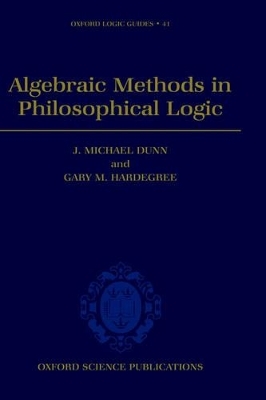
Algebraic Methods in Philosophical Logic
Seiten
2001
Oxford University Press (Verlag)
978-0-19-853192-0 (ISBN)
Oxford University Press (Verlag)
978-0-19-853192-0 (ISBN)
This comprehensive text shows how various notions of logic can be viewed as notions of universal algebra providing more advanced concepts for those who have an introductory knowledge of algebraic logic, as well as those wishing to delve into more theoretical aspects.
This comprehensive text demonstrates how various notions of logic can be viewed as notions of universal algebra. It is aimed primarily for logisticians in mathematics, philosophy, computer science and linguistics with an interest in algebraic logic, but is also accessible to those from a non-logistics background. It is suitable for researchers, graduates and advanced undergraduates who have an introductory knowledge of algebraic logic providing more advanced concepts, as well as more theoretical aspects. The main theme is that standard algebraic results (representations) translate into standard logical results (completeness). Other themes involve identification of a class of algebras appropriate for classical and non-classical logic studies, including: gaggles, distributoids, partial- gaggles, and tonoids. An imporatant sub title is that logic is fundamentally information based, with its main elements being propositions, that can be understood as sets of information states. Logics are considered in various senses e.g. systems of theorems, consequence relations and, symmetric consequence relations.
This comprehensive text demonstrates how various notions of logic can be viewed as notions of universal algebra. It is aimed primarily for logisticians in mathematics, philosophy, computer science and linguistics with an interest in algebraic logic, but is also accessible to those from a non-logistics background. It is suitable for researchers, graduates and advanced undergraduates who have an introductory knowledge of algebraic logic providing more advanced concepts, as well as more theoretical aspects. The main theme is that standard algebraic results (representations) translate into standard logical results (completeness). Other themes involve identification of a class of algebras appropriate for classical and non-classical logic studies, including: gaggles, distributoids, partial- gaggles, and tonoids. An imporatant sub title is that logic is fundamentally information based, with its main elements being propositions, that can be understood as sets of information states. Logics are considered in various senses e.g. systems of theorems, consequence relations and, symmetric consequence relations.
1. Introduction ; 2. Universal Algebra ; 3. Order, Lattices and Boolean Algebras ; 4. Syntax ; 5. Semantics ; 6. Logic ; 7. Matrices and Atlases ; 8. Representation Theorems ; 9. Classical Propositional Logic ; 10. Modal Logic and Closure Algebras ; 11. Intuitionistic Logic ; 12. Gaggles: General Galois Logics ; 13. Representation and Duality ; 14. References ; 15. Index
| Erscheint lt. Verlag | 1.7.2001 |
|---|---|
| Reihe/Serie | Oxford Logic Guides ; 41 |
| Verlagsort | Oxford |
| Sprache | englisch |
| Maße | 163 x 242 mm |
| Gewicht | 807 g |
| Themenwelt | Geisteswissenschaften ► Philosophie ► Logik |
| Mathematik / Informatik ► Mathematik ► Algebra | |
| Mathematik / Informatik ► Mathematik ► Logik / Mengenlehre | |
| ISBN-10 | 0-19-853192-3 / 0198531923 |
| ISBN-13 | 978-0-19-853192-0 / 9780198531920 |
| Zustand | Neuware |
| Haben Sie eine Frage zum Produkt? |
Mehr entdecken
aus dem Bereich
aus dem Bereich
ein Gegenentwurf zum kurzfristigen Denken : so werden wir zu den …
Buch | Hardcover (2023)
REDLINE (Verlag)
CHF 27,90
Buch | Softcover (2023)
De Gruyter (Verlag)
CHF 34,90


